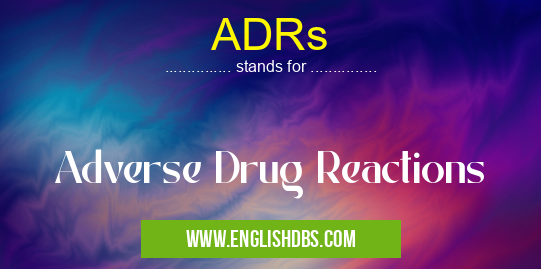What does ADRS mean in DRUGS
ADRs are a significant concern in healthcare, affecting a substantial proportion of patients taking medications. They can range from mild and temporary side effects to severe, life-threatening events. Understanding the causes, symptoms, and management of ADRs is crucial for healthcare professionals and patients alike.

ADRs meaning in Drugs in Medical
ADRs mostly used in an acronym Drugs in Category Medical that means Adverse Drug Reactions
Shorthand: ADRs,
Full Form: Adverse Drug Reactions
For more information of "Adverse Drug Reactions", see the section below.
ADRs Meaning in Medical
ADRs stands for Adverse Drug Reactions, which refer to any harmful or unwanted effects experienced by an individual after taking a medication.
Causes of ADRs
ADRs can arise due to various factors, including:
- Individual patient characteristics: Age, gender, genetic makeup, and underlying health conditions can influence the risk of ADRs.
- Drug factors: The type of medication, dosage, and route of administration can affect the likelihood of ADRs.
- Drug interactions: Concomitant use of multiple medications can increase the risk of ADRs due to drug-drug interactions.
- Environmental factors: Exposure to toxins or other substances can alter drug metabolism and increase the risk of ADRs.
Symptoms of ADRs
ADRs can manifest in a wide range of symptoms, depending on the drug and the individual's response. Common symptoms include:
- Gastrointestinal disturbances (nausea, vomiting, diarrhea)
- Skin reactions (rashes, itching, hives)
- Neurological symptoms (headaches, dizziness, seizures)
- Cardiovascular events (arrhythmias, hypotension)
- Organ toxicity (liver damage, kidney failure)
Management of ADRs
Managing ADRs involves:
- Identifying and discontinuing the offending drug: Once an ADR is suspected, the healthcare provider should stop the medication and investigate the cause.
- Providing supportive care: Treatment may focus on alleviating symptoms and managing any complications.
- Monitoring the patient: Close follow-up is essential to ensure the ADR resolves and does not progress to a more severe condition.
- Reporting ADRs: Healthcare professionals are obligated to report suspected ADRs to regulatory authorities to ensure patient safety and monitor drug safety.
Essential Questions and Answers on Adverse Drug Reactions in "MEDICAL»DRUGS"
What are Adverse Drug Reactions (ADRs)?
ADRs are harmful and unintended effects caused by taking medications. They can range from mild to severe and life-threatening.
How common are ADRs?
ADRs are very common, affecting up to 15% of hospitalized patients and 10% of outpatients.
What are the different types of ADRs?
ADRs can be classified based on their severity, mechanism, and time of occurrence. Common types include allergic reactions, gastrointestinal upset, liver toxicity, kidney damage, and cardiovascular events.
What causes ADRs?
ADRs can be caused by various factors, including the drug's pharmacology, individual susceptibility, and interactions with other medications or substances.
How are ADRs diagnosed?
Diagnosing ADRs involves a thorough history and physical examination, as well as laboratory tests and imaging studies to rule out other causes.
How are ADRs treated?
Treatment for ADRs depends on the severity and type of reaction. Mild reactions may require supportive care, while severe reactions may necessitate discontinuation of the medication and specific interventions.
How can ADRs be prevented?
Preventive measures include proper medication selection, appropriate dosing, monitoring for interactions, and educating patients about potential risks.
What should I do if I experience an ADR?
If you suspect an ADR, stop taking the medication and contact your healthcare provider immediately. Provide them with a detailed account of your symptoms and the medications you are taking.
Final Words: ADRs are a common and potentially serious consequence of medication use. Understanding the causes, symptoms, and management of ADRs is crucial for healthcare professionals and patients. By recognizing and addressing ADRs promptly, we can minimize their impact on patient health and outcomes.
ADRs also stands for: |
|
| All stands for ADRS |
